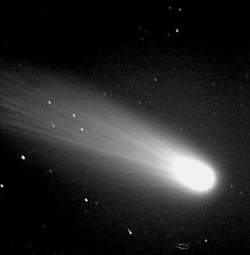U.S. spacecraft brings comet dust to Earth
During its long, 7-year-mission, Stardust traveled approximately 4.63 billion kilometers in space
National Aeronautics and Space Administration has finally scored again following a period of failures over the last few years. The Americans even pioneered in the capture and delivery of comet dust samples from the so-called deep space to Earth. On January 15, at about 13.10 Moscow time, the sample collectors of the Stardust spacecraft descended by parachute to Earth. The 45-kilogram collectors contain comet dust particles captured by Stardust while flying by comet Wild-2.
It is worth recalling the 1970s when the Soviet space probe Luna-24 took samples of the lunar soil and delivered them to Earth. However, the U.S. spacecraft Stardust set a new record after capturing comet particles at a distance of billions of kilometers from Earth. 
During its long, 7-year-mission, Stardust traveled approximately 4.63 billion kilometers in space. Flying at 25,195 km per hour, the spacecraft passed within 3,060 km of the small asteroid Annifrank and took more than 70 pictures of it. Stardust fulfilled its main goal in January 2004 after its captured comet dust samples while passing 230 km of Wild-2. The Stardust mission cost NASA $212 million.
At about 13.00 Moscow time the craft's aerogel sample collectors reentered the earth's atmosphere at an altitude of 125 km. The collectors hit the atmosphere at 46,440 km per hour breaking another speed record for man-made vehicle in reentry. The speed brake parachute opened at around 32 km; the main parachute opened at about 3 km and the collectors landed smoothly on the U.S. Air Force Test and Training range in Utah.
The collectors were then carried by helicopter to Lyndon Johnson Space Center. Scientists will open the collectors and analyze the comet dust particles. Comets are space bodies that were made up of water ice and dust 4.6 million years when the Solar System was taking shape. Taking a closer look at the comet dust particles will probably enable scientists to learn more about the origin of the whole planetary system.
Subscribe to Pravda.Ru Telegram channel, Facebook, RSS!





